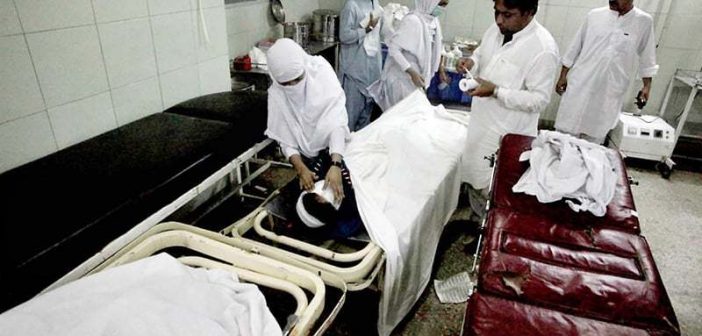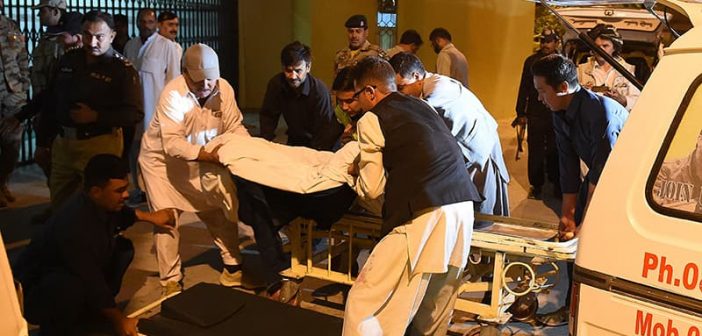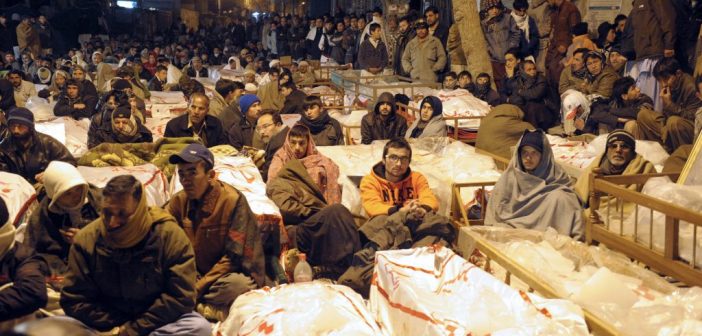By Ali Arqam
Widowed during an attack on an Ashura procession – the most important annual ritual of the Shia sect – Maryam was left with three children to raise, no means of support – her husband was a daily-wage labourer who left no savings – and no viable source of income for the future. A member of the beleaguered Hazara community, with hardly any work opportunities and forced isolation due to the omnipresent threat against her visibly distinct community, Maryam was left with few options for the survival of her family. Finally she had to resort to begging on the streets behind cover of a burqa. The family survived, and 10 years later, her children are the family bread-earners, eking out a living by doing petty jobs.
While the blast that took Maryam’s husband’s life was one of the worst in terms of the number of people it killed, it was neither the first, nor the last attack on Hazaras in Quetta. In 2001, eight members of the Hazara community were targeted and killed in an attack near Podgali Chowk. There were several other attacks and in 2003, 12 police cadets, all Hazaras, were killed in another terrorist attack.
According to an activist from the Hazara community, “The wave of mass killings of the Hazaras began in Afghanistan, when the Taliban regime took on the Hazarajat. They were declared infidels in the religious decrees signed by the Taliban leaders, and the massacre of Hazaras began. Cases in point: the attacks in Mazar-e-Sharif and Bamiyan.”
He adds, “The sectarian organisations which have consistently been targeting Shias for their faith across Pakistan – from Gilgit, Baltistan, to Bolan, and from Karachi to Kohat and Kurram Agency – share the views of the Taliban leaders.”
The Hazaras face a double whammy: they are seen as ‘The Other’ because of their ethnicity and their faith, and hated due to their opposition to the Taliban regime. To add to their woes are their distinct facial features that leave them particularly vulnerable to attacks.
Says Farid Kasi, a human rights activist and member of the business community from Quetta, “Hazaras have long been part of the social fabric of Quetta city. But growing radicalisation, the Wahhabisation of society, and religious militancy have alienated them.
“A decade back, people from the Hazara community – traders, labourers and workers – were visible everywhere. But the violence against them, due to their faith, and the troubled political history of their links to Afghanistan and Iran, have forced them to become invisible in the public space. And it is getting worse for them with every passing day.”
Aman Khan, an activist from the community and an Urdu blogger, recalls the years when he was studying at the University of Balochistan, “During my undergraduate studies, I had to visit the university at least once a week. I would take Kirani road and Sabzal road through Podgali to get to the university, and take another route – the Arbab Karam Khan road or Raisani road – on the way home. I never felt intimidated,” he says.
He continues, “It was a different experience when I came back in 2015 after spending a couple of years in Karachi for my MBA. I got off the bus at Hazar Ganji, and hailed a rickshaw to take me home. When I sat in the rickshaw, the driver said grimly, “Please cover your face, you might be killed because of your identifiable features. I felt a shiver run down my spine.”
Bakht Bibi, also a widow from the Hazara community, was forced to live alone in Hazara Town after her husband Chaman Ali was killed in an attack six years ago, and her son Salman Ali moved to Australia.
In December 2010, when they were being driven home from the bazaar by their son Salman Ali in the taxi he owned, the family was attacked by assailants who opened fire on them. Bakht Bibi’s husband, Chaman Ali, died on the spot, due to the gunshot wounds to his head. Salman Ali took seven bullets and was critically wounded, but survived.
Traumatised, and despite his mother’s entreaties, Salman Ali decided to apply for asylum to Australia, managed to get it, and after selling his taxi and borrowing money from relatives, moved Down Under. His lonely mother Bakht Bibi has to wait for another three years to be able to reunite with her son, only possible when he gets Australian citizenship.
Given the looming threat hanging like a Damocles’ Sword over their head, the Hazaras have been compelled to become increasingly insular.
Two of the Hazara localities – Marriabad and Hazara Town – are virtual “No go areas” for people from other ethnicities. And while entering the Marriabad area through Alamdar road, people are stopped at the Frontier Corps (FC) checkpost. They are only allowed to enter the township if they submit their identity cards and enter their names and other identification details in a register. Additionally, all visitors have to mention the name of the specific person from the Hazara community they are going to see, and that person is called to the checkpost to personally identify the visitor.
The FC commander on duty at the checkpost discloses, “These measures have been put in place to ensure the safety and security of both, the residents, and the person who is visiting them.” He adds that the Hazara community have also constituted their own security arrangements inside, and that there have been instances of people having been caught by them and beaten if they failed to explain their presence within the confines of these localities.
A woman who was visiting from Afghanistan, and her passport had the visa stamped on it to prove as much, was refused entry at the Marriabad Town checkpost: she could not offer the name of anyone specific who she wanted to visit. “I have come a long way and am sure some of my relatives are there. But each time I go, they do not let me in to find them.”
A Pashtun man, aged 55, discloses how, when he arrived with his family – two women and a little girl – at the Hazara Town checkpost in his car and told the guards he wanted to visit a jeweller living in the town, the FC commander told him to call the jeweller, and ask him to personally come to the checkpost to escort him in. “I thought, why would the jeweller leave his shop to receive me?” says the man. “When I explained this to the FC commander, he finally allowed us to enter the township, but not before I was warned that if I did anything to arouse suspicion, the Hazara men would deal with me themselves.”
Expanding on this climate of fear the Hazaras live in, Yasin Nadir, a 22-year-old activist from the community says, “Increasingly there is a political, social and cultural disconnect from the rest of Quetta for us. We cannot identify our enemy, but we can be easily identified. We are trapped.”
Nadir recently completed his Masters in Peace and Conflict Studies from the National Defense University (NDU) Islamabad, and is working with an organisation there. He recalls a recent journey from Islamabad to Quetta on a visit to his family. “We entered the city through Kuchlak, a town on the outskirts of Quetta, which recently came into the news after Shahbaz Taseer made his first contact with his family from there after four years of being held hostage. My uncle was accompanying me, and he played tour guide through the journey. I was completely unaware of the places he identified as areas of interest, even though they were in the environs of my hometown, because I grew up in the last decade, when it became hard for us to roam around freely without fear,” says Nadir.
The fear today is all-pervasive. On October 4, four women were killed when terrorists stopped a passenger bus, identified three of the women as Hazaras, and opened fire on them.
A Pashtun woman also lost her life in the attack. Following this, protesters from the Hazara community and civil society gathered outside the Quetta Press Club and chanted slogans against the terrorists, terming the killing an attack on the honour of Balochistan. Tribal tradition dictates that women cannot be attacked.
Dr Shah Muhammad Marri, an intellectual and author of books on the history of Balochistan, however, has his own views on this ‘tribal honour.’ “It is baseless to say that tribal traditions do not allow women to be targeted out of honour or respect for them; patriarchal norms consider women to be subordinate, and not equal. That is why attacking a woman is thought of as an inglorious act,” he says.
And Abid Mir, a journalist, author and publisher of books, cites other past attacks targeting women in Quetta. A bus of university students – mostly female – was bombed, acid attacks on female students have been reported, and an academic from Balochistan University, Professor Nazima Abu Talib, was recently killed.
Dr Shah Muhammad Marri says, “The terrorists who are targeting the Hazaras, or those following the Salafi ideology, do not follow any tribal code or traditions. They are ruthless killers, and do not spare anyone.”
And even if not mown down themselves, the biggest victims of this ruthless killing are unarguably the women of Balochistan. They have borne the excruciating pain of burying their sons, husbands, fathers and brothers, and are often left to fend for themselves and their families in a harsh, dangerous environment.
In 1935, when Quetta was hit by the worst natural calamity in its history, when a devastating earthquake turned the city into ruins, thousands of people were buried under the rubble. The British authorities built small huts to be used as shelters by the survivors. These huts were called ‘widows’ huts.’
Today, it is man-made disasters, such as the hydra of jihadi militancy, which have reduced areas to rubble and women to widows. And in cities like Quetta, on virtually every street is a home where widows and bereaved mothers and daughters mourn the loss of their husbands, sons and fathers. Perhaps the current government should take a page out of the colonial rulers’ book.
Source & copyright


No Country for Hazaras | Hazara-Azeri
[…] No Country for Hazaras […]